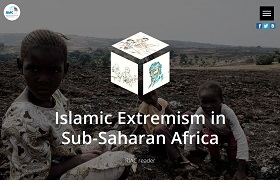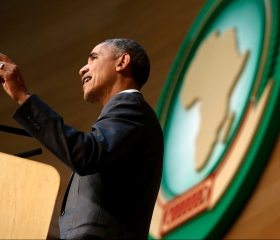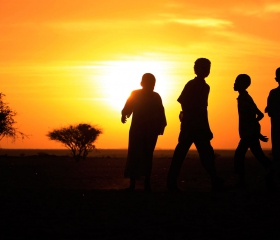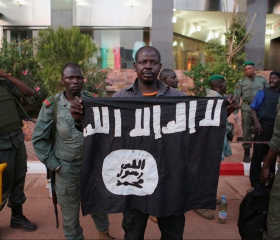A commentary on “L’endiguement renforcé: les politiques de sécurité de la France et des États-Unis en Afrique” IFRI report, February 2016.
One of the most recent trends in African affairs has been the growing security cooperation between France and the United States, termed by IFRI as “reinforced containment”. A logical response to the many security challenges on the continent, the French-US approach may be creating as many problems as it seeks to fix.
In 2016 the French Institute of International Relations (IFRI) produced a report entitled “Reinforced Containment: US and French Security Policies in Africa” on the dynamics of French and US security policy vis-à-vis the African continent. Authored by Jean-Yves Haine, the report comes at a pivotal moment both for many African nations and external actors involved.
After much effort at containment, conflict management and resolution in Africa, some soul-searching is certainly in order. Civil wars rage on in the Central African Republic and Libya, a deadly Islamist insurgency is destabilizing Nigeria, other countries of the Sahel region (Mauritania, Mali, Burkina Faso, Chad) are facing a region-wide insurgency of their own, while the Horn of Africa with Somalia at its core remains a tinderbox. To great international shock, in the past year terrorists have managed to carry out major attacks against civilian infrastructure in Mali (November 2015), Burkina Faso (January 2016), and Côte d’Ivoire (March 2016), in all three cases seemingly undeterred by a strong French military presence. All the while, although the flow of migrants and refugees leaving these volatile and dangerous places for European shores has decreased, arrivals still number in the hundreds of thousands. The bottom line, as the report rightly indicates, is that African security issues have clear implications for Europe and beyond.
The Evolving Visions of Africa
Outsiders' encounters with Africa have historically tended to result in much myth-crafting and simplification, where Africa is seen through one twisted lens, be it disease, war, famine, or something equally dreadful. Although the end of the Cold War ushered in new challenges for the continent, it also shed light on the complexity of African issues and the fact that they required nuanced, multidimensional, and, most importantly, balanced solutions. A significant step in this direction was, for instance, the idea of the “Security-Development Nexus”, an instructive conceptualization of security and development as mutually reinforcing and constitutive phenomena. But if the 1990s brought “human security” with its focus on economic well-being, health, and access to food, the 2000s and the “War on Terror” let in from the cold a darker and grimmer vision of Africa: an Africa of failing states, of vast ungoverned spaces, of transnational threats, and terrorists. African problems gradually came to be securitized and seen as requiring military, as opposed to humanitarian or economic, solutions. In the Western political discourse, responding to humanitarian crises and fostering development essentially gave way to fighting terrorism.
In part, military solutions are indeed more necessary than before. The Sahel and the Horn of Africa regions, for instance, are prime examples of radical Islam rising and terrorist activities becoming internationalized. Malian groups like Al-Mourabitoun and the Somali Al-Shabaab have declared allegiance to Al-Qaeda, Nigerian Boko Haram has attempted to reinvent itself as the West Africa Province of the Islamic State, while all of these groups engage in some degree of local and regional rivalry in which the local population and the broader region only stand to lose. Many African states are coming under unprecedented threat from non-state actors, are often unable to deliver public services, and exercise control over their territory, providing further reasons for the deficiencies of African states to be securitized by the international community. Today it is precisely the threat of terrorism and the failures of some African states that help justify military interventions by foreign powers, and no other powers intervene in Africa as much as France and the United States.
What of the Unions?
Despite significant efforts at “Africanization” or “Europeanization”, security policy in and towards Africa remains, for the most part, national. The African Union, which succeeded the Organization of African Unity in 2002, has made impressive strides in terms of doctrinal and structural reform: it adopted a more active stance towards conflict via the new doctrine of non-indifference as opposed to non-intervention, as well as devised a complex African Peace and Security Architecture (APSA) based on the notion that Africa can and should come up with its own solutions to the continent’s security problems. Alas, the full implementation of the APSA along with the development of the African Standby Force (ASF) —the AU’s regular peacekeeping mechanism—is fraught with challenges like the integration and coordination of the Regional Economic Communities (RECs) that make up the AU, issues of interoperability, and general combat readiness. At the end of the day, the AU continues to rely rather heavily on external funding, while the AU peacekeeping missions already in place—except the one in Somalia (AMISOM)—are usually replaced by multidimensional UN missions capable of tackling complex peacebuilding tasks.
That said, Europe’s security policy has hit an impasse of its own. The EU’s Common Security and Defense Policy (CSDP) remains more or less paralyzed by the divergent strategic visions and interests of EU member-states, insufficient coordination, and sluggish reaction to crises. The 2012 Mali intervention is a case in point. With London in recovery mode after Iraq and Kabul, Berlin more interested in CSDP as a concept rather than a military tool, and other EU countries largely undecided, France failed to convince its CSDP partners to accept the French security agenda and generate consensus for the Mali intervention. Thus, France chose to act unilaterally with the EU establishing a small training mission (EUTM Mali) only a year later.
The Eagle and the Rooster
At present, France maintains a large presence across the continent. It runs Operation Barkhane – a counter-terrorism mission spanning 5 countries of the Sahel (Mali, Niger, Mauritania, Burkina Faso) with a center in N’Djamena (Chad) and regional bases in Cote d’Ivoire, Djibouti, Gabon, and Senegal. Additionally, there are 4 operations bases in N’Djamena, Niamey (Niger), Gao (Mali), and Ouagadougou (Burkina Faso), along with prepositioned special forces. Overall, France has fielded 3000 personnel, 20 helicopters, 200 vehicles, 10 transport aircraft, 6 assault planes, and 3 drones. All of this stands in contrast to the US presence, consisting of fairly compact drone and surveillance aircraft bases in Burkina Faso, Niger, and Uganda, a 4000-strong base in Djibouti, and limited personnel stationed in South Sudan, Kenya, Mali, Nigeria, and Somalia. These operational differences show that although France and the United States assign different degrees of importance to African affairs, the continent features prominently among their strategic concerns.
For France, African security is important for several reasons. First of all, France has long defined itself through the role of “African gendarme” having an exclusive responsibility to protect friendly African nations whenever necessary. The country’s ability to intervene in Africa is a big part of France’s great power identity, since, as Jean-Yves Haine rightly notes, “without Africa France would be a medium-power”. Secondly, France has come to see some African regions—namely, North Africa and the Sahel—as the “southernmost border of French territory” with clear implications for French security at home. Lastly, by intervening in Africa France seeks to protect its economic interests. The importance of this factor is often exaggerated (as was the case with the intervention in Mali), for imports from African nations, e.g., uranium from Niger and oil from the Gulf of Guinea, account for only 3% of total French imports, but the interests do exist.
For the US, Africa does not represent a vital strategic interest, but the continent’s importance is clear. Following the traumatic experiences of 1993 when bodies of US soldiers were dragged through the dusty streets of Mogadishu by rebel militias, military interventions were largely abandoned in favour of humanitarian and development aid. Later, after the 1998 attacks on US embassies in Kenya and Tanzania, the events of 9/11, and the 2012 Benghazi attack, Africa re-emerged as a US security concern. As opposed to France, in its fight against terrorism the US prefers to keep its engagement to a minimum, act through regional partners, and maintain a relatively light footprint, using targeted killings via drones and Special Forces missions.
Incidentally, this is precisely where French and US strategies overlap and complement each other. France, still seeing Africa as its proverbial backyard or “pré carré”, is conveniently willing to bear the costs and risks that come with a large military presence and lengthy interventions. This, in turn, greatly benefits the US by allowing it to focus on other engagements, i.e., Iraq and Afghanistan, while letting the French make use of American surveillance and logistics infrastructure. This basically makes the US and France de-facto strategic partners facing the evolving African security landscape.
The Problem with Containment
The report rightly argues that the strategy of “reinforced containment” — even taken at its best — represents a trade-off. Eschewing deceptively simple military solutions to conflicts, the French-US strategy does not eliminate the terrorist threat, but instead aims to actively contain it in hope for a political solution down the road. Informed by past mistakes and failures with Al-Qaida and the Taliban, such an approach is fairly reasonable. It is important to understand, however, that it remains problematic in several important respects.
Firstly, containment requires time, and lots of it. For a political solution to become possible, many stars and factors need to align, be it effective external pressure on the parties to the conflict, evolution of the conflict into a mutually hurting stalemate leaving the belligerents no choice but to negotiate, or the military or economic exhaustion of the parties. “Ripeness” of the conflict for resolution can rarely be rushed, and if the intervening party, unable to continue with what is essentially a waiting game, decides to withdraw before a political opening appears, the conflict might begin anew.
Secondly, as Jean-Yves Haine also notes, containment tends to focus almost exclusively on counter-terrorism, whereas in order to be effective in the long run, it needs to be coupled with economic development and humanitarian aid policies. It would be necessary to avoid further securitization that tends to impose a simplistic black and white vision on the situation ignoring the complex local realities, including corruption, institutional weakness, and the ethnic factor in politics.
Thirdly, containment based on acting through regional and local actors may expose the intervening countries to what the French researcher Jean-François Bayart famously called “extraversion”. While African actors—local elites or else—might be dependent on external actors for security, it is entirely possible for them to leverage their position of dependence to manipulate France or the US to pursue their own narrowly defined political objectives thereby perpetuating the conflict.
Lastly, a case could be made that the problem with “reinforced containment” or any other security policy in Africa is that the intervening parties are usually part of the problem in the first place. In the past 50 years, France meddled and intervened militarily in Africa numerous times, appealing to family-like ties to African countries and its self-proclaimed historical responsibilities. These interventions more often than not served to install governments friendly to France, protect French economic interests, or reaffirm its international standing and role. In the 1960s and 1970s France signed defense agreements with a number of African states (Gabon, Central African Republic, Cote d’Ivoire, Togo, Cameroon, Senegal, Djibouti, and the Comoros), which allowed African leaders to call on France to intervene in cases of foreign aggression or domestic instability, while allowing France to have a permanent military presence in these countries. Thus if containment is conveniently framed as a “war of necessity” in response to the many threats and challenges of the African security environment, then France has long been a constitutive element thereof and bears at least some of the responsibility.
***
Overall, the IFRI’s report is timely and fairly balanced — the United States and France are indeed pursuing similar security goals in Africa, and so far French-American cooperation seems to satisfy a wide range of international and regional actors. It is important to note, however, that deeper and closer involvement of France and the US in African security issues can have serious implications on many fronts: from further securitization of African issues to France losing interest and turning further away from the EU’s Common Security and Defense Policy, as well as possible future tensions with China, increasingly viewing itself as an important security partner for the African Union and a host of African countries, such as Angola, Zimbabwe, the Democratic Republic of the Congo, and the Sudans. In the meantime, when all other policies are worse, containment—in spite of its many limitations—likely remains the best way forward.









